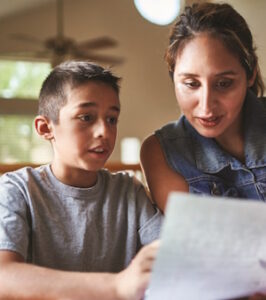The Back-to-School Toolkit When Kids and Parents Have ADHD
Attention Magazine August 2024
As the summer break comes to an end, parents and kids with ADHD often find themselves filled with hope and anticipation for a better school year than the last one. The backpacks are packed, new school supplies are sorted, and parents are hopeful they can establish structured bedtime routines and oversee homework completion.
The reality of managing ADHD in the context of school and home life can often lead to these well-intentioned plans falling by the wayside, however. Balancing multiple children’s needs, extracurricular activities, and work schedules is challenging. This struggle becomes even more pronounced in households where both a parent (or parents) and child (or children) deal with ADHD.
In my three decades in education, initially as a teacher and later as a tutor and founder of Educational Connections, I’ve discovered that there isn’t a one-size-cures-all solution for weak executive functioning. Still, there are certain things parents and kids can do to make life at home and school a bit easier.
Prime start times for homework
Let’s begin with the task of getting started on homework. Instead of stressing about when it’ll get done, let’s switch gears and focus on when it’ll start.


I’ve discovered four prime times to kick off the homework hustle: right after school, after a thirty-minute break (best for younger students), before dinner, or right after dinner (best if there’s sports practice). Establishing a consistent homework start time will help counter the typical “I’ll do it later” syndrome and will help prevent your late-night homework nagging.
Now, getting kids to open up about their homework plans isn’t always easy. Instead of the usual “Got any homework?” routine, ask, “What’s on your school plate tomorrow? What might you get started on right now?”
In a perfect world, your child would say, “Well, I need to study for my biology test, do my algebra homework, and finish that essay because I have a baseball game tomorrow and won’t have time.” But in reality, your child likely won’t list everything they’ll need to do. However, the question should still spark them to think of their priorities.
Get organized: Sunday Sessions and Clean Sweep
Let’s dive into organization next, a crucial piece of the puzzle for a less stressful school week. Using Sundays as your prep day can make a world of difference. That’s why I’m all about Sunday Sessions, which are dedicated times on Sundays where you and your child can sit down and plan for the upcoming week. For the older kiddos, schedule a sit-down on Sunday morning to discuss the upcoming week. For the younger ones, an evening chat might work better.
Adding this to your plate doesn’t have to feel overwhelming if you “habit stack.” This is one of my favorite executive function coaching hacks, and it’s all about seamlessly weaving new routines into your daily grind. Habit stacking is a technique where you attach a new habit to an existing one, making it easier to remember and follow. For example, after your family’s Sunday breakfast or dinner, you can habit stack your Sunday Session, where you and your child can discuss the upcoming week while you nail down your personal and work commitments.
Start the conversation by saying, “Let’s map out the week. What’s on your plate that needs to be tackled?” If they mention a biology test on Thursday or an essay due in two weeks, dive deeper. Ask them, “What’s the one thing you can do to get started?”
Here’s a pro tip: Encourage your child to jot down all their major tests, assignments, and extracurricular commitments on a weekly calendar every Sunday. Stick it on the fridge—it’ll work wonders, particularly for parents managing their own ADHD. And remember to create a duplicate for kids splitting time between two homes. A little effort on Sunday saves you and your child from last-minute panic on a school night because something slipped your mind.
If your child’s not swamped with homework but could use a little organizational TLC, cue the Clean Sweep on Sundays. “Clean Sweep” is a term I use to describe a family activity where everyone pitches in to tidy up for the week ahead. Your kids can clean out their backpacks, spruce up their study spots, and carry dirty laundry from the bedroom to the wash. As a bonus, Clean Sweep is a great time to tackle your own organizational tasks, like folding that mountain of clean laundry or tackling that pile of mail.
Whatever format you choose for your Sunday Session, make it a weekly tradition. The reward? That gratifying feeling of achievement that comes from establishing new habits, both for you and your child. This sense of accomplishment will inspire and motivate you to continue implementing these strategies throughout the school year.

End morning madness with the Launching Pad
Next, let’s tackle the morning madness. If last school year felt like a perpetual rush to get out the door on time, it’s time for a new game plan. Research backs this up: When a household is filled with shouting and scrambling, stress levels skyrocket for both kids and parents. But when parents keep their cool, it sets the stage for smoother sailing for everyone.
One of my all-time favorite morning time-saver strategies is the Launching Pad. Picture this: a designated spot by the door where your child dumps everything they’ll need for the next day. Backpacks, soccer cleats, you name it, all go in the basket or bin. And for you, it might just be a simple hook where you always hang your keys and purse when you walk in the door.
The brilliance of the Launching Pad lies in its simplicity: it sets your child up for a seamless start to the day by gathering everything they need ahead of time.
Now, for us parents, a little prep goes a long way. Try laying out your work clothes the night before. And why not knock out those school lunches after dinner? Small changes like these can significantly cut down on morning chaos.
And here’s a time-saver you won’t regret: nighttime showers. This is especially helpful if you have girls who spend most of the morning blow-drying their hair. Say goodbye to the morning rush and hello to a more serene start to your day. Your sanity—and your children—will thank you for it!
Create a Homework Hotspot
I’m a big believer in practical systems that promote organization and time management in ADHD homes, such as designated study areas and visual reminders.
So, let’s talk about creating a Homework Hotspot for your child—a distraction-free zone where they can dive into their schoolwork. The kitchen table works wonders for younger kids, keeping you within earshot for support. Older students can opt for a desk in their bedroom—but please, not their bed!
Here’s a handy homework trick I’ve used with my own kids: a shower caddy stocked with pencils, pens, calculators, and other essentials. It keeps everything in one place, making it easy to transport wherever needed.
Now, let’s turn our attention to you, the parent. Create a dedicated space where all school-related paperwork can find its home, helping to end the perpetual paper clutter. Utilize two baskets—one labeled Need to Do and the other Done—to maintain organization and keep everything on track. If your child has something requiring your signature, ensure they place it in the Need to Do basket for your attention.

Employ ADHD household tools
In an ADHD household, visuals reign supreme over verbal reminders. Have you considered adding a whiteboard to your parenting toolkit? It’s a fantastic tool for mapping out assignments at the start of each week. Plus, there’s nothing quite like the satisfaction of crossing off tasks as they’re completed.
Let’s not forget about analog clocks. Research shows they’re invaluable for helping kids—and adults with ADHD—better grasp the passage of time. Whether in the bedroom or the dining room, having an analog clock within view of where your child does homework can work wonders for time management skills.
Ultimately, the goal for this school year is to get our kids to start thinking for themselves so they can be more independent in the future. Creating and adhering to simple daily and weekly routines will make a big difference in your child’s school success and your family’s harmony at home.
As parents with ADHD, we’re often inundated with strategies for our kids but may find it challenging to implement new ideas effectively. The key lies in selecting just a few new ideas that benefit both you and your child. When you tackle tasks together and achieve progress in tandem, it feels rewarding and increases the likelihood of these practices becoming ingrained habits.


 As a former teacher, author, and speaker, Ann Dolin, MEd, is committed to equipping parents and students to succeed academically and enjoy the K-12 journey together. With more than thirty years combined of teaching, tutoring, and consulting experience, she and her tutors and executive function coaches at Educational Connections (
As a former teacher, author, and speaker, Ann Dolin, MEd, is committed to equipping parents and students to succeed academically and enjoy the K-12 journey together. With more than thirty years combined of teaching, tutoring, and consulting experience, she and her tutors and executive function coaches at Educational Connections (